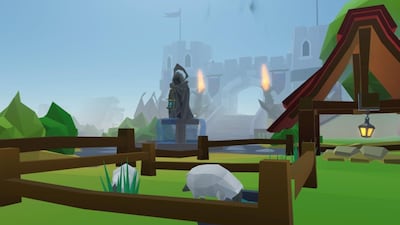(Bloomberg) -- Investors may not be clamoring to buy offices and hotels right now, but in virtual reality, property deals are surging and attracting millions of real-life dollars.
It was inevitable, then, that someone would start a fund.
Republic Real Estate, a firm that’s raising money to buy distressed condos in the physical world, is launching an invite-only fund next week aimed at investors seeking to buy virtual land. The venture plans to purchase parcels across several online “metaverses” and develop them into virtual hotels, stores and other uses, with the goal of increasing their value among cryptocurrency enthusiasts.
The minimum investment in the Republic Realm Digital Real Estate Fund is $25,000.
“Real-world real estate is very uncertain now,” said Janine Yorio, head of Republic Real Estate. “Housing prices are at an all-time high. Meanwhile, offices are empty, hotels are empty. This feels insulated from a lot of those real-world risks.”
Plots sell daily in online worlds such as Decentraland, a virtual place with its own economy, currency and social events calendar, accessible to anyone with a web browser. And values for such assets are multiplying.
This year through to March 15, the average price paid per parcel in Decentraland was $2,703 – more than triple what it was in 2020, according to NonFungible.com, which tracks the sales. Land prices quadrupled in the metaverse called Cryptovoxels, from $821 a parcel last year to $3,895 in the first two and half months of 2021.
The most expensive deal ever recorded came in February, when eight lots sold for a combined $1.5 million on the gaming platform Axie Infinity, according to NonFungible.
“There is obviously some fear-of-missing-out phenomenon behind this,” Gauthier Zuppinger, chief operating officer at NonFungible, said in an email. “The best, rarest places are almost all purchased. The secondary market shows that the first buyers sell their assets for way more than the initial price.”
Each land parcel is a non-fungible token, or NFT – a unique asset that can’t be forged or replicated, just like physical land in the real world.
The value of online real estate rises as more people buy digital art or other collectibles and need a place to showcase them, according to Zuppinger. Many artists and designers also are turning to the virtual world to host what they create, as consumers spend more time there, Ms Yorio said.
And for a real estate investor, that means there’s value in owning well-trafficked space.
Republic, which used its own money to buy more than 30 parcels across four metaverses, is in talks with a real-life hospitality brand that is looking to co-develop a hotel and bar on one of those sites, Ms Yorio said. The lodging firm would collaborate on the virtual hotel design, and pay Republic to develop it.
Like swanky hotels in physical cities, the site would ideally become a well-regarded gathering place – which then draws other retailers and developers to pay up for parcels nearby.
“Buying land today in virtual worlds may end up feeling a lot like buying land in Manhattan in the 1750s,” Ms Yorio said. “There is massive growth ahead, and now is the time to get in on the ground floor.”

